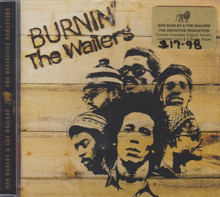

Critical reception The Wailers' gold record award for Burnin' in Nine Mile, Jamaica The songs "Duppy Conqueror", "Small Axe", and "Put It On" are re-recordings of songs previously released on their co productions with Lee Perry’s Upsetters Label. Music and lyrics īurnin ' opens with one of The Wailers best known songs, the call to action "Get Up, Stand Up" and includes a more confrontational and militant tone than previous records, such as in another Wailers standard turned into a number one hit by Eric Clapton, "I Shot the Sheriff". It was mixed and overdubbed by Chris Blackwell at Island Records' Basing Street studios in London during the spring of 1973 while the band were touring in support of their previous album, Catch a Fire. The album was recorded at Harry J's studio in Kingston, Jamaica, with the Wailers producing. A commercial and critical success in the United States, Burnin ' was certified Gold and later added to the National Recording Registry, with the Library of Congress deeming it historically and culturally significant. It was the last album before Marley, Peter Tosh and Bunny Wailer decided to pursue solo careers, while continuing their local releases through their company Tuff Gong Records. It contains the song " I Shot the Sheriff".

It was written by all three members and recorded and produced by the Wailers in Jamaica, contemporaneously with tracks from the Catch a Fire album with further recording, mixing and completion while on the Catch a Fire tour in London. Independent producer Ben Manilla interviewed Rita Marley, Chris Blackwell and Jim Henke, author of Marley Nation and chief curator of the Rock and Roll Hall of Fame and Museum, about the album.Burnin' is the sixth album by Jamaican reggae group the Wailers (also known as Bob Marley and the Wailers), released in October 1973. So it pointed towards Bob and gave him the respect that catapulted him really into a whole other level of credibility." "Because Eric at that time was, literally, like, you know, like God in the music business, and God had gone to Bob Marley for his material. "When he recorded that song, that was probably the biggest break, really, that Bob had had," Blackwell says. When Chris Blackwell, founder of Island Records, sent the record to his contacts in the music industry, Eric Clapton heard something he liked and transformed "I Shot the Sheriff" into a No. "We were grown and raised in the ghetto, so we knew nothing more than a ghetto life," she says.īut Burnin' was also a breakthrough for Marley - and for reggae music's acceptance in the U.S. Rita Marley, his widow, sees the connection. The political stridency of Burnin' was informed by the slums where Marley lived. Burnin' covers a variety of topics and moods, from the militancy of "Get Up, Stand Up" and "I Shot the Sheriff" to the heartfelt rage and poverty-induced despair of "Burnin' and Lootin'." The final track, the traditional "Rastaman Chant," sounds a more redemptive note. While the band was rhythmically tight, Marley dominates this album.


It turned out to be Bob Marley's big break.īurnin' was the last album the reggae master released under the name "The Wailers," and it featured the final performances of Peter Tosh and Bunny Wailer with the group. In 1973, a reggae group on the verge of breaking up released an album - its second that year - filled with militant anthems inspired by life in the Jamaican slums.


 0 kommentar(er)
0 kommentar(er)
